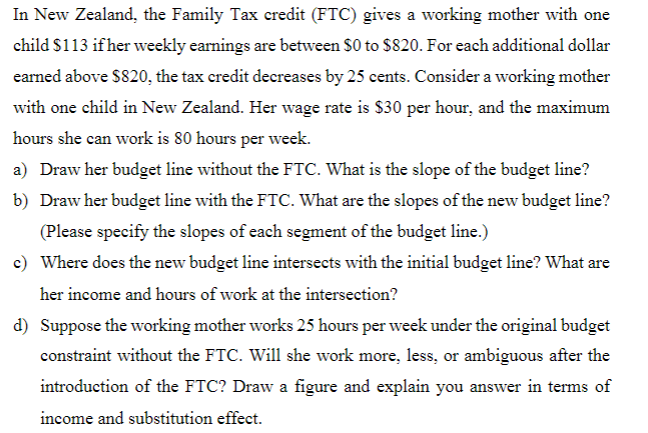In New Zealand, the Family Tax credit (FTC) gives a working mother with one child $113 if her weekly earnings are between $0 to $820. For each additional dollar earned above $820, the tax credit decreases by 25 cents. Consider a working mother with one child in New Zealand. Her wage rate is $30 per hour, and the maximum hours she can work is 80 hours per week. a) Draw her budget line without the FTC. What is the slope of the budget line? b) Draw her budget line with the FTC. What are the slopes of the new budget line? (Please specify the slopes of each segment of the budget line.) c) Where does the new budget line intersects with the initial budget line? What are her income and hours of work at the intersection? d) Suppose the working mother works 25 hours per week under the original budget constraint without the FTC. Will she work more, less, or ambiguous after the introduction of the FTC? Draw a figure and explain you answer in terms of income and substitution effect.
In New Zealand, the Family Tax credit (FTC) gives a working mother with one child $113 if her weekly earnings are between $0 to $820. For each additional dollar earned above $820, the tax credit decreases by 25 cents. Consider a working mother with one child in New Zealand. Her wage rate is $30 per hour, and the maximum hours she can work is 80 hours per week. a) Draw her budget line without the FTC. What is the slope of the budget line? b) Draw her budget line with the FTC. What are the slopes of the new budget line? (Please specify the slopes of each segment of the budget line.) c) Where does the new budget line intersects with the initial budget line? What are her income and hours of work at the intersection? d) Suppose the working mother works 25 hours per week under the original budget constraint without the FTC. Will she work more, less, or ambiguous after the introduction of the FTC? Draw a figure and explain you answer in terms of income and substitution effect.
Principles of Microeconomics
7th Edition
ISBN:9781305156050
Author:N. Gregory Mankiw
Publisher:N. Gregory Mankiw
Chapter21: The Theory Of Consumer Choice
Section: Chapter Questions
Problem 9PA
Related questions
Question
just subpart (d) please. thank you

Transcribed Image Text:In New Zealand, the Family Tax credit (FTC) gives a working mother with one
child $113 if her weekly earnings are between $0 to $820. For each additional dollar
earned above $820, the tax credit decreases by 25 cents. Consider a working mother
with one child in New Zealand. Her wage rate is $30 per hour, and the maximum
hours she can work is 80 hours per week.
a) Draw her budget line without the FTC. What is the slope of the budget line?
b) Draw her budget line with the FTC. What are the slopes of the new budget line?
(Please specify the slopes of each segment of the budget line.)
c) Where does the new budget line intersects with the initial budget line? What are
her income and hours of work at the intersection?
d) Suppose the working mother works 25 hours per week under the original budget
constraint without the FTC. Will she work more, less, or ambiguous after the
introduction of the FTC? Draw a figure and explain you answer in terms of
income and substitution effect.
Expert Solution
This question has been solved!
Explore an expertly crafted, step-by-step solution for a thorough understanding of key concepts.
Step by step
Solved in 2 steps

Recommended textbooks for you

Principles of Microeconomics
Economics
ISBN:
9781305156050
Author:
N. Gregory Mankiw
Publisher:
Cengage Learning

Principles of Economics, 7th Edition (MindTap Cou…
Economics
ISBN:
9781285165875
Author:
N. Gregory Mankiw
Publisher:
Cengage Learning

Principles of Economics (MindTap Course List)
Economics
ISBN:
9781305585126
Author:
N. Gregory Mankiw
Publisher:
Cengage Learning

Principles of Microeconomics
Economics
ISBN:
9781305156050
Author:
N. Gregory Mankiw
Publisher:
Cengage Learning

Principles of Economics, 7th Edition (MindTap Cou…
Economics
ISBN:
9781285165875
Author:
N. Gregory Mankiw
Publisher:
Cengage Learning

Principles of Economics (MindTap Course List)
Economics
ISBN:
9781305585126
Author:
N. Gregory Mankiw
Publisher:
Cengage Learning

Principles of Microeconomics (MindTap Course List)
Economics
ISBN:
9781305971493
Author:
N. Gregory Mankiw
Publisher:
Cengage Learning

Economics Today and Tomorrow, Student Edition
Economics
ISBN:
9780078747663
Author:
McGraw-Hill
Publisher:
Glencoe/McGraw-Hill School Pub Co